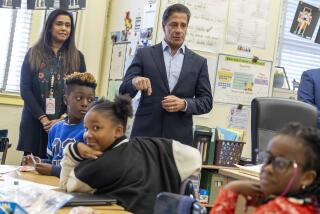School Year Starts Sept. 1, Ends Aug. 31
- Share via
OAKLAND — Nathan Inwood’s school year starts Sept. 1 and ends Aug. 31. He likes it that way.
“I don’t have to wait for after school to have fun,” the 17-year-old senior says. “I’m having fun in school.”
Inwood is one of about 350 students attending the private Beacon Day and High School, one of a handful of schools in the nation with a continuous school year.
The schools are open 10 1/2 hours a day; the longest break is a week between Christmas and New Year’s. Other than that, students who want to vacation do what their parents do--ask for time off and schedule a week or two as necessary.
It’s a big change from the traditional school year, where June heralds the textbook-tossing start of what can seem like an endless summer vacation.
But Inwood said it isn’t a big wrench getting up and going to school in July: “It’s not like I am on my own with it.”
Set in a converted warehouse along Oakland’s gritty waterfront, Beacon attracts a diverse student body. The high school is about 60% white, 30% black, 5% Asian and 5% Latino, said co-founder Leslie Medine. Fees are $450 a month for elementary students, $550 a month for the high school.
Class time takes up about six hours a day, with before- and after-school programs available. Day school students attend 240 days; high school students have a 215-day year, compared to the typical public school year of about 180 days.
“It’s a lot of serious work,” said school spokeswoman Diana Gordon.
Beacon’s innovative approach drew a visit in March from the National Education Commission on Time and Learning, which will report to Congress next year on whether American children should spend more time in school.
Medine said the idea behind the schedule was to improve the curriculum and cut out wasted review time each fall.
Students say more time means they don’t have to panic if they are slow to grasp a particular concept. Another advantage is that they are placed according to developmental level in various subjects, not by age, and there is little formal testing.
The concept of year-round school is not new. Schools in Japan and Europe have long had extended school years and days.
But few schools in the United States have followed suit, said Gary Marx, spokesman for the American Assn. of School Administrators.
“There are skyrocketing expectations for schools in this country but there’s also a fairly substantial public commitment to maintaining adequate summer time off,” he said.
Some private schools offer special summer sessions, and some public schools have started keeping classrooms open year-round, mainly to accommodate crowded districts.
One obstacle to year-round school, officials say, is paying teachers for extra time and getting them to agree to the lost holiday.
But teachers at Beacon said the lost time off is a small price for the pleasure of being able to teach properly.
Medine declined to give her teachers’ salary range; she said they are paid more, commensurate to the added time they must work. She said she runs Beacon on about the same amount of money per student as her public school peers, with the advantage of not paying for “all those folks downtown doing whatever it is they’re doing down there.”
Parent Judi Yeager, who is also a teacher at Oakland High School, said she has adapted some of Beacon’s ideas to the magnet program in which she teaches and would like to see more innovations to a system plagued by violence and low test scores.
“Kids are OK when they come in. The system can break down a kid’s love of learning,” she said.
Oakland schools spokeswoman Sherri Willis said public schools are doing their best under the constrictions of state and federal controls and dwindling funds.
“Sure students deserve more instruction, but given the umbrellas that we work underneath we have to get approval from the bottom and the top before we can do anything,” she said.
Students at Beacon say they’re glad of the opportunity to try a different kind of school.
“It’s a lot more relaxed over here,” said 15-year-old Zuiho Taniguchi, who attends summer school in Japan, which he said tends to be pressure-filled.
At Beacon, there’s none of that grim, succeed-or-else attitude, students said.
“Once we had a water fight to celebrate some class being over,” said 11-year-old Noah Finneburgh.
“If school’s done right it can be fun,” Gordon said.
More to Read
Sign up for Essential California
The most important California stories and recommendations in your inbox every morning.
You may occasionally receive promotional content from the Los Angeles Times.













